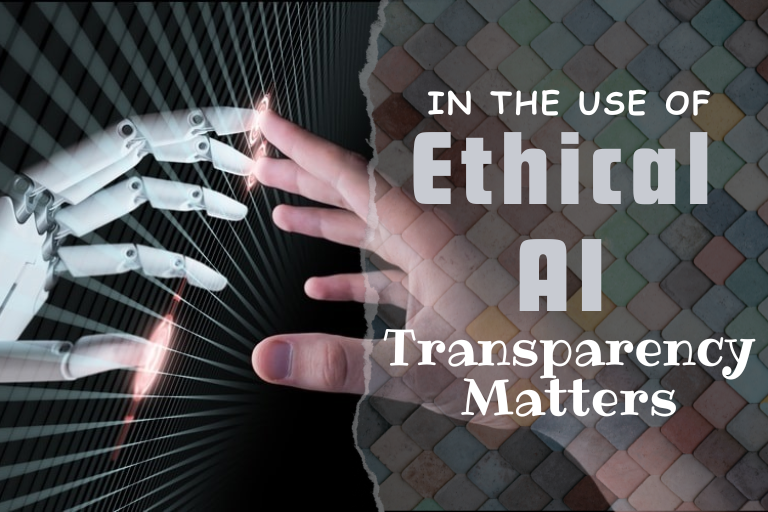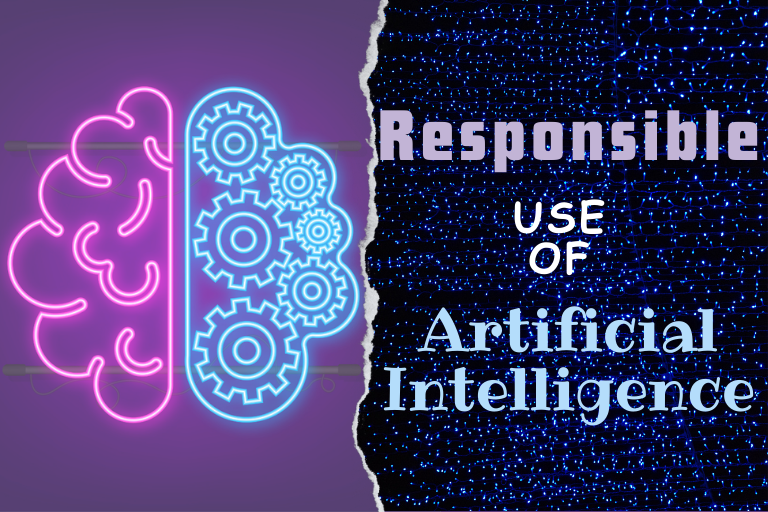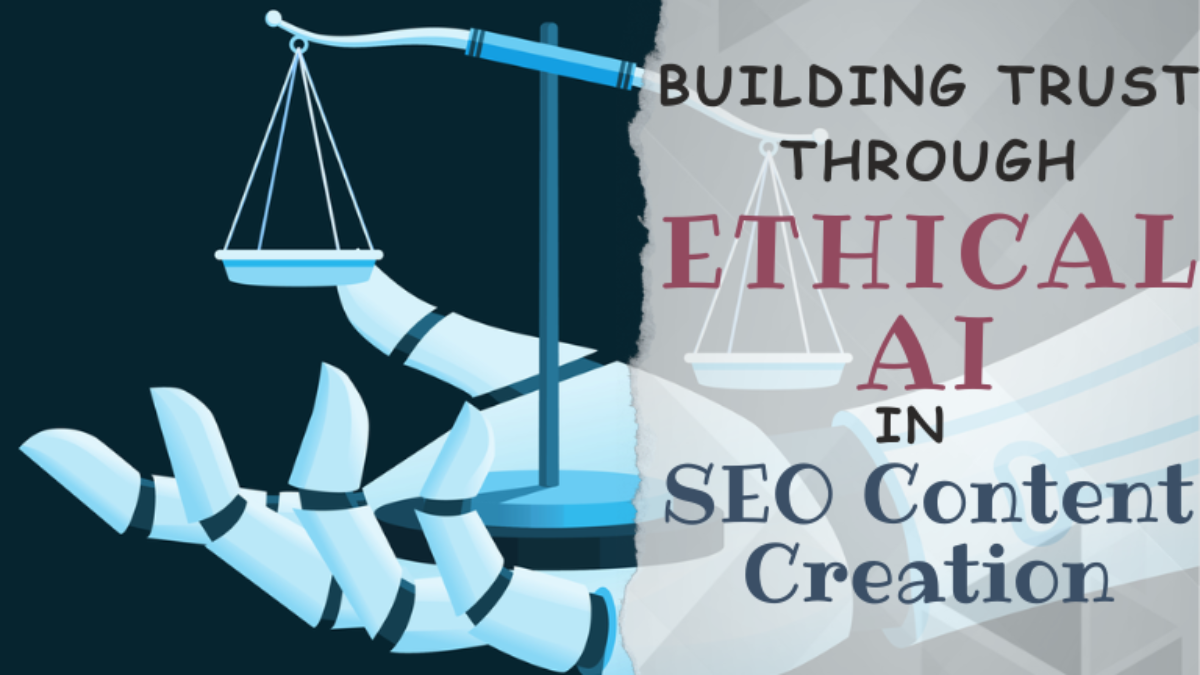Table of Contents
ToggleIntroduction
Have you been writing your SEO web content with a help from AI bots?
Well, I believe everyone does these days, but are you sure you are not completely relying on AI bots to do the entire content writing tasks for the web?
The thing is that the content generated by AI is not guaranteed to be 100% correct and so, it is not ensured if AI-driven practices align with a responsible and transparent strategy of content creation. This poses a threat to your online presence and growth if you are relying completely on AI without paying any heed to its ethical implications.
What’s important to understand is that the use of AI in SEO content creation and content marketing should not be viewed as a step to replace humans. It rather should be adopted to make work easier and better for humans because AI helps teams simultaneously handle bulky data, identify patterns, and do repetitive tasks quickly and accurately, not to mention its capability of finding trends and improving content quality. Better still, the interaction of humans needs to be involved in the process of AI in SEO content creation because AI can not outclass human intelligence whatsoever.
With the disruptive use of AI in SEO content creation and content strategy implementation, ethical risks have come into view like the creation of biased content, or poor quality content which can mislead readers. This caters to the need for gearing in transparency in the use of AI for SEO Content Creation along with human interaction.
Before we dive into what transparency means in the use of AI and how it matters let’s first consider understanding what exactly Ethical AI is.
What exactly is Ethical AI?
Ethical AI, also termed Ethical Artificial Intelligence, refers to the development and deployment of AI technologies in a manner that aligns with ethical principles, values, and standards. It encompasses the responsible design, creation, and use of AI systems to ensure they respect human rights, dignity, diversity, privacy, and societal well-being.
Ethical AI involves considering the potential impacts of AI applications on individuals, communities, and the environment while striving to minimize biases, discrimination, and unintended consequences. It emphasizes transparency, accountability, fairness, and inclusivity throughout the AI lifecycle, from data collection and model training to deployment and monitoring.
Ultimately, Ethical AI aims to foster trust, and confidence in AI technologies, promoting their beneficial use for the betterment of society while mitigating potential risks and harms.
In terms of SEO content creation, where marketers deploy AI tools to attract wider audiences and find better business solutions, ethical AI refers to the ethical concerns associated with AI content generation like bias and discrimination, privacy and data protection, as well as accountability and transparency. There is a significant quantity of complexity involved in deriving the ethical implications of using AI in the content creation process. Let us navigate a slight overview of AI in content creation.
AI in Content Creation: An Overview
Deployment of AI tools in the generation or assistance in the generation of online digital content which may be blog posts, articles, videos, audio, or images is what’s referred to as AI in content creation. An overview of AI in content creation would include the following key points:
- A growing trend with the potential to multiply efficiency and productivity for a diverse number of industries
- Not operating on a single algorithm, rather is operational on different types of AI algorithms that are geared with advanced tech modules like Natural Language Processing, Image and Video Recognition, and Video Transcription.
- Natural Language Processing (NLP) proves invaluable in crafting written material sourced from structured or unstructured data. By parsing through extensive datasets, it adeptly crafts summaries, articles, or reports that closely resemble human language.
- The recognition of images and videos serves to classify and label visual content, aiding in the selection of suitable graphics or images for marketing collateral.
- Utilizing audio transcription, speech-to-text technology converts audio content into written text, facilitating the creation of transcripts, captions, or subtitles.
- Employing AI in content creation extends to optimizing content through the analysis of user engagement metrics, search engine rankings, and interactions across social media platforms.
To put it together, AI in Content Creation has the potential to wholly revolutionize the practices of content generation, the way content is distributed as well as how it is consumed.
However, given the ethical risks associated with the use of AI and of course taking into consideration the fact that with great power comes responsibility, contemplating on the ethical implications of AI in content creation is crucial to ensure that biases are not prolonged and that the user privacy is protected.
Ethical Considerations of AI in Content Creation
1) Bias and Discrimination
Bias and discrimination present significant ethical dilemmas in AI content creation, stemming from algorithms trained on biased datasets, resulting in inaccurate or unfair outcomes. Here’s a detailed look:
- Bias arises when algorithms exhibit favoritism towards specific groups, such as race or gender.
- Discrimination occurs when biased outcomes lead to unfavorable treatment of particular groups. For instance, if an AI model lacks diversity in its training data, it may generate biased content that perpetuates stereotypes or overlooks certain demographics, potentially leading to discriminatory content.
- Discrimination can also manifest in content delivery or targeting, where different demographic groups receive distinct ads, raising concerns of discrimination.
- Marketers must remain vigilant to avoid biased datasets, ensuring the AI algorithm produces impartial content.
- Diversifying datasets to encompass a wide range of people and cultures is essential to mitigate bias and discrimination.
- Regular monitoring and evaluation of the algorithm are crucial to identifying and addressing biases promptly.
In summary, addressing bias and discrimination in AI content creation is imperative to prevent adverse effects on marginalized groups. Marketers must proactively mitigate these issues to ensure the production of fair and unbiased content. Also, with modern-day search engines analyzing user intent to generate SERPs, ignoring the underlying implication of using AI in content creation like bias and discrimination can badly affect your SEO.
2) User Privacy and Data Protection
Privacy and data protection stand as pivotal ethical considerations in the realm of AI content creation. With AI algorithms sifting through extensive data pools, there looms a risk of gathering and utilizing personal information without the prior consent of users. This not only breaches their privacy rights but also erodes trust in both the technology and the company utilizing it.
To mitigate this concern, companies must ensure that their AI applications align with pertinent privacy and data protection regulations. They should also uphold transparency regarding data collection processes, and usage purposes, and offer users the option to opt out if they wish to abstain from data utilization.
Another aspect of safeguarding user privacy involves integrating privacy by design principles during the development of AI algorithms. This entails embedding privacy and data protection mechanisms into the system’s design, prioritizing them as integral components rather than secondary considerations.
In essence, ethical AI content creation necessitates companies to prioritize privacy and data protection through regulatory compliance, transparency, and the adoption of privacy by design principles. Such measures will foster user trust and ensure that the technology benefits all while minimizing potential harms.
3) Accountability and Transparency
In AI content creation, accountability and transparency mean that marketers and AI developers should clearly explain how their algorithms work and take responsibility for the results they produce. This involves being able to show how the AI made its decisions and accepting any negative effects it might have on people or society.
These principles are vital for ethical AI because they build trust and prevent harm. AI algorithms can create biased or unfair content, but without transparency, it’s hard to spot and fix these issues.
To ensure accountability and transparency, marketers and developers must regularly test and evaluate their algorithms and listen to feedback from users. They should also be open about how they collect and use data, giving people control over their data and the content they see.
Ultimately, being accountable and transparent about AI in content creation means making ethical choices and prioritizing the well-being of individuals and society.
The Importance of Addressing Ethical Concerns
Marketers must prioritize addressing ethical concerns related to AI in content creation. While AI can automatically generate content, it’s crucial to guarantee that the produced content is free from discrimination, respects privacy, and maintains transparency. Addressing these concerns is essential for companies to uphold a positive image and reputation. Neglecting ethical considerations can lead to legal troubles and negative public perception.
It’s crucial to recognize that the impartiality of AI is contingent on the data it’s trained on. Hence, diversifying input data is imperative to prevent AI from perpetuating existing biases. Regularly monitoring and assessing AI algorithms can ensure their ethical and transparent functioning. Engaging in ethical decision-making is also essential to avoid inadvertently causing harm through content creation. Ultimately, by prioritizing ethical AI content creation, marketers can foster a more trustworthy and equitable environment for both customers and stakeholders.
How Transparency Matters when it comes to the use of Ethical AI in SEO?

Public trust, disclosure, and transparency are necessary governing ethics for the use of AI technologies in various industries.
What transparency actually refers to in the use of AI for content creation is the clarity and openness of the artificial intelligence-geared writing tools in terms of their functioning, algorithms, and data sources. Content creators must understand how AI systems work, how they get to the decisions they do, and how those decisions impact the quality of content they generate.
AI tools that lack transparency are susceptible to generating content that could misguide readers with inaccurate content generation, or kindle bias and discrimination amongst group of people. Contrary to it, ensuring the understanding of transparency in AI algorithms means that the users who use AI tools for content creation educate themselves about the underlying processes, procedures, and decision-making criteria of AI tools used. This helps content creators better understand how AI tools generate their content giving them a clear opportunity to assess, edit, and discard parts of content that are likely to kindle potential bias or provoke other ethical concerns. That’s the very reason why AI tools should always be used as a complement in the creation of digital content and not as a complete replacement to humans crafting pieces of content.
Simply put, transparency enables accountability and allows for the inspection of potential discriminatory outcomes. This clearly states the need for transparency and why it matters in building trust when using Ethical AI for SEO Content Creation.
Now that we’ve understood what transparency means and how it matters in Ethical AI for SEO Content Creation, further down the article, let us understand and learn:
- How unethical use of AI for content creation impacts your online presence and deteriorates your brand image
- How to leverage AI writing tools responsibly and ethically
Not Using Ethical AI in SEO Content Creation: How it affects your Online Presence
Unethical use of AI tools in SEO content creation can lead to the damage of original author’s or brand’s reputation which might ultimately lead to potential legal consequences.
If you are a brand, and you largely depend on AI tools for content creation without countering the underlying unethical implications associated with them, you might lose potential customers and important leads when the content you use for your brand marketing is AI-generated, and not human-checked for probable reliability and accuracy, as well as bias and discrimination. Here’s how the unethical use of AI for SEO content creation can hurt your online presence:
- Content generated might be unreliable or inaccurate which can convey wrong information to readers, dangling their trust in your brand.
Explanation: Reliability and Accuracy are key factors in evaluating AI writing tools. Reliability involves the consistency and trustworthiness of the content produced, ensuring it meets desired standards. Accuracy focuses on the correctness and precision of the information generated, crucial for avoiding errors or misinformation. While these tools rely on algorithms and machine learning, ensuring reliability and accuracy can be challenging due to potential biases and limitations in recognizing nuances or context. Developers must continuously enhance algorithms and models to improve reliability and accuracy, while users should independently verify the content produced.
- Content generated might be acquired directly from an existing source and so fails to pass the Plagiarism check by search engines which depreciates your content ranking on SERPs.
Explanation: Transparency and accountability are essential to address concerns of plagiarism and copyright infringement. Transparency involves openness about how these tools function and the data sources they use, vital for understanding their decision-making process. Lack of transparency can lead to unintended plagiarism or copyright issues.
- AI-generated content might be skewed in favor of one group or another which could again make you lose part of your audience
Explanation: Addressing bias is critical to ensure fairness and inclusiveness in the content generated. AI systems can unintentionally perpetuate stereotypes or discriminate against certain groups, highlighting the need for diversifying training data and improving bias detection capabilities.
- AI tools used for content creation pose data breach and privacy risks which can affect your relationship with your audience
Explanation: Data privacy and security are ethical concerns related to the protection of personal information used in AI writing tools. Developers must ensure secure storage and handling of user data, transparently informing users about data practices, and implementing robust security measures to prevent unauthorized access or breaches. Users should also be cautious about sharing sensitive information and choose tools that prioritize data privacy and security.
Making use of AI Writing Tools Responsibly

Above mentioned points clearly state that Ethical use of AI along with a human touch are necessary if AI is to be used in SEO content creation process. Responsible use of AI generated content is the top priority when making use of AI tools. Below are some of the steps that users can implement to leverage the use of AI for SEO content creation.
1) Implementing proper attribution and citation with AI writing tools
This includes acknowledging and providing credit to the original creators or sources of information. Complete acknowledgment includes but is not necessarily limited to:
- Giving recognition and credit to honor the work of others that has helped in adding credibility to your content.
- Including citations to help readers verify information and access original material whenever necessary.
- Circumventing plagiarism and respecting intellectual property rights to avoid unnecessary and unethical act of representing others’ work as your own without appropriate attribution.
- Confirming sources and checking for credibility of all the AI-generated content information before citing any source in the content
- Differentiating AI-generated content from your original work content to make clear sections created by the tool and those that pertain to your own work.
- Adhering to specific style guidelines to ensure consistency and precision
2) Checking and confirming with independent verification
Independent verification here refers to cross-checking for the accuracy and validity of AI-generated content and not solely relying on their output. Other than the accuracy checks mentioned in the previous step of proper attribution and citation, independent verification involves additional steps and key points like:
- Application of Critical Analysis and critical thinking skills to evaluate AI-generated content for logical coherence, consistency, and possible bias
- Cross-checking the AI-generated content through cross-referencing with multiple reputable sources to validate its credibility and correctness.
- Engaging in the subject matter experts to include the required human touch ensuring the accuracy of generated content.
- Tapping into online content repositories to consult available official reports, research papers, or governmental sources to double-check data and statistics provided by AI in content creation
- Learning user experience from your content by establishing a feedback loop mechanism where users are allowed to report inaccuracies and false information so as to make better the performance of AI tools
- Focusing on user responsibility by encouraging them to remain vigilant and take responsibility for independently verifying the information before relying on it.
- Identifying and countering potential errors by analyzing the AI-generated content for any errors, logical fallacies, or inconsistencies that might have slipped through
- Making use of fact-checking platforms or reputable websites that specialize in verifying claims and information
Independent verification is crucial as it acts as a safety measure against misinformation or inaccuracies that arise due to the limitations and bias in AI content writing tools.
Conclusion
Responsible use of AI-generated content entails the ethical obligation of the users of technology to employ AI writing tools judiciously and in accordance with legal and ethical standards. This involves acknowledging the limitations of AI technology and taking measures to address potential risks.
One key aspect is ensuring proper attribution and citation of AI-generated content, giving credit to the AI tool and preventing plagiarism. Independent verification is also crucial; users should fact-check AI-generated content to avoid disseminating inaccurate information. Additionally, caution is advised when relying solely on AI-generated content for critical purposes like legal or medical advice, as human expertise is essential for accuracy and context.
In summary, responsible use of AI-generated content necessitates conscientious user behaviour, including critical evaluation of outputs, adherence to ethical standards, and supplementing AI tool outputs with human judgment to uphold content quality and integrity. AI should be used as a complement in the practices of SEO content creation rather than a replacement to human beings.
Take it to your Inbox!
Subscribe to my Newsletter
Never miss the Tips, Tricks, and Insights that I share on my site.


Add a Comment